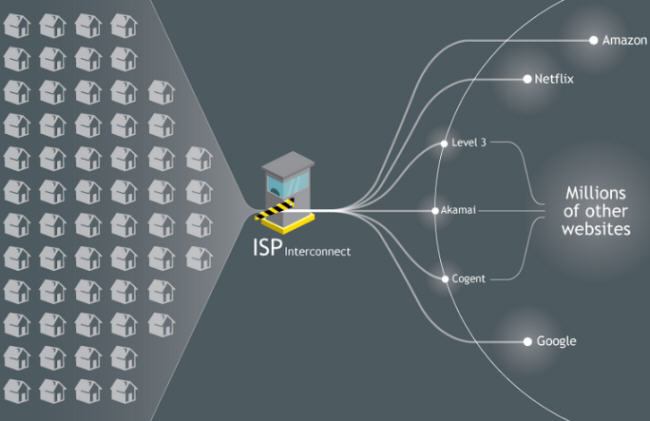Reed Hastings, CEO of Netflix
Reed Hastings, CEO of movie and TV-streaming service Netflix, has called for net neutrality to be protected and warned that ISPs are now effectively charging internet companies tolls to allow consumers to surf the internet.
Last month, Netflix agreed a multi-million dollar deal with Comcast in the US to ensure Netflix users could enjoy a fast service and not be throttled.
At the start of this year Netflix had an estimated 40.4m paying subscribers and had successfully made the move into producing its own original content with productions such as House of Cards and Orange is the New Black.
According to a 2013 report by Sandvine, Netflix is the biggest source of North American downstream web traffic, at 32.3pc.
At the heart of the debate on net neutrality is the conviction among telecoms companies that they have built the networks but aren’t being remunerated for it.
In effect, if the telcos have their way, they would be charging companies, such as Google, Facebook, Amazon and Netflix, for the access by millions of people to their services over the respective networks.
It has been claimed in recent months that ISPs have been deliberately slowing down – throttling in industry parlance – services like Netflix and Amazon, in turn frustrating consumers.
So it’s a stand-off

The internet today, according to Netflix
In a passionate argument to ensure the internet continues to improve lives, Hastings called for net neutrality to be defended.
“The internet is improving lives everywhere – democratising access to ideas, services and goods. To ensure the internet remains humanity’s most important platform for progress, net neutrality must be defended and strengthened.
“The essence of net neutrality is that ISPs, such as AT&T and Comcast, don’t restrict, influence or otherwise meddle with the choices consumers make. The traditional form of net neutrality which was recently overturned by a Verizon lawsuit is important, but insufficient.
“This weak net neutrality isn’t enough to protect an open, competitive internet; a stronger form of net neutrality is required,” he said.
Toll trolls holding consumers to ransom?
“Strong net neutrality additionally prevents ISPs from charging a toll for interconnection to services like Netflix, YouTube, or Skype, or intermediaries such as Cogent, Akamai or Level 3, to deliver the services and data requested by ISP residential subscribers. Instead, they must provide sufficient access to their network without charge.
“Some major ISPs, like Cablevision, already practise strong net neutrality and for their broadband subscribers, the quality of Netflix and other streaming services is outstanding. But on other big ISPs, due to a lack of sufficient interconnectivity, Netflix performance has been constrained, subjecting consumers who pay a lot of money for high-speed internet to high buffering rates, long wait times and poor video quality.”
Hastings said having agreed to pay big ISPs money, sufficient capacity is made available for a proper quality of service for consumers. However, he said if this kind of leverage is effective against Netflix which has the cash, what about the implications for smaller internet companies?
He said the same tolls are being charged by companies, such as Cogent and Level 3, and if the practice continues, the ramifications for consumers and internet services could be considerable.
“Without strong net neutrality, big ISPs can demand potentially escalating fees for the interconnection required to deliver high quality service. The big ISPs can make these demands – driving up costs and prices for everyone else – because of their market position.
“For any given US household, there is often only one or two choices for getting high-speed internet access and that’s unlikely to change. Furthermore, internet access is often bundled with other services, making it challenging to switch ISPs. It is this lack of consumer choice that leads to the need for strong net neutrality.
“Netflix believes strong net neutrality is critical, but in the near term we will in cases pay the toll to the powerful ISPs to protect our consumer experience. When we do so, we don’t pay for priority access against competitors, just for interconnection. A few weeks ago, we agreed to pay Comcast and our members are now getting a good experience again. Comcast has been an industry leader in supporting weak net neutrality, and we hope they’ll support strong net neutrality, as well.”
Consumers should get exactly the speeds they pay for
Hastings said ISPs point to Netflix’s 30pc or so share of peak residential internet traffic in the US as a reason for the company to share costs with ISPs.
“But they don’t also offer for Netflix or similar services to share in the ISPs revenue, so cost-sharing makes no sense. When an ISP sells a consumer a 10 or 50Mbps internet package, the consumer should get that rate, no matter where the data is coming from.”
He also denied that Netflix is “dumping data” onto ISPs’ networks. “Netflix isn’t ‘dumping’ data; it’s satisfying requests made by ISP customers who pay a lot of money for high-speed internet. Netflix doesn’t send data unless members request a movie or TV show.”
Strong net neutrality, Hastings argued, would also be a faster way for ISPs to see a return on their investment and said some big ISPs are extracting a toll simply because they can.
“ISPs around the world are investing in high-speed internet and most already practise strong net neutrality. With strong net neutrality, new services requiring high-speed internet can emerge and become popular, spurring even more demand for the lucrative high-speed packages ISPs offer.
“With strong net neutrality, everyone avoids the kind of brinkmanship over blackouts that plague the cable industry and harms consumers,” Hastings said.
Video interview with Netflix CEO Reed Hastings
We interviewed Reed Hastings two years ago when he launched Netflix in Ireland and the UK. Check it out: